Family offices are built to ensure that wealth, values, and vision endure across generations. However, not all heirs may act in the best interest of the family legacy. When an individual’s behavior or choices directly conflict with the family’s governance rules or long-term mission, families may need to limit their control or access to wealth and decision-making.
In Malaysia, this can be done through careful legal and structural planning—using tools like trust conditions, foundation charters, and governance frameworks to manage or even disinherit non-compliant heirs. This article explores how families can enforce accountability within the family office and protect the family’s purpose without causing unnecessary conflict or legal complications.
Understanding Non-Compliance in a Family Office Context
In the context of a family office, non-compliance refers to actions by heirs that go against the values, rules, or responsibilities agreed upon by the family. This can include:
- Misuse of funds or family resources
- Refusal to follow the family charter or constitution
- Engaging in criminal or unethical behaviour
- Neglecting duties tied to legacy projects or philanthropy
- Openly rejecting the family’s long-term mission or governance structure
Such behaviours not only put financial assets at risk, but also undermine family unity, trust, and the long-term goals of the family office. Addressing non-compliance is essential to preserve the integrity and purpose of the family’s legacy for future generations.

Legal Tools to Restrict or Remove Heirs from Control
Families in Malaysia have several legal and structural tools available to limit or remove non-compliant heirs from decision-making roles or inheritance benefits within a family office. These tools help protect the family’s legacy while enforcing accountability.
Amendments to the Family Constitution:
The family charter can clearly define expectations, participation rules, and behaviors that lead to disqualification. Regular updates ensure alignment with evolving family values.
Trust Deeds with Conditional Clauses:
Malaysian trusts can include conditions for distributions, such as completing education, maintaining ethical conduct, or contributing to family initiatives. Non-compliance can delay or reduce access to funds.
Foundations with Appointed Boards:
Labuan foundations or similar structures can appoint independent council members or directors to oversee decisions objectively, reducing the risk of nepotism or disruptive influence.
Exclusion from Voting Rights:
In both trusts and foundations, specific heirs can be excluded from governance roles or voting rights, limiting their control without entirely disinheriting them.
These mechanisms, when built into the family office structure, provide legal clarity and reinforce the message that wealth and leadership must be earned—not automatically inherited.

Appointing Independent Governance for Fair Enforcement
When managing sensitive issues like restricting or disinheriting heirs, families should avoid making emotionally driven or biased decisions. One effective way to ensure fairness is by appointing independent governance professionals within the family office structure.
This can include:
- Neutral trustees to oversee trusts and enforce conditions without family interference
- External legal counsel to interpret the family constitution and advise on compliance
- Independent directors or executives in the family office or foundation board to manage decisions impartially

By delegating enforcement to trusted third parties, families can ensure that rules are applied consistently, conflicts are minimized, and decisions—especially around disinheritance—are grounded in governance, not personal emotion. This helps maintain integrity and unity within the family office over time.
Conclusion
Disinheriting or restricting heirs from family office control is never an easy decision—but it’s sometimes necessary to protect the family’s legacy, values, and long-term vision. Through well-structured legal tools such as conditional trusts, family constitutions, and independent governance, families in Malaysia can enforce accountability while maintaining unity and fairness.
By proactively embedding these safeguards into the family office, families send a clear message: inheritance comes with responsibility. With the right planning and professional support, families can ensure their wealth is stewarded by those who respect and uphold the legacy it represents.
Concerned about an heir’s influence on your family legacy? Speak with us to explore how legal structures can help you maintain control, accountability, and generational impact—on your terms.




